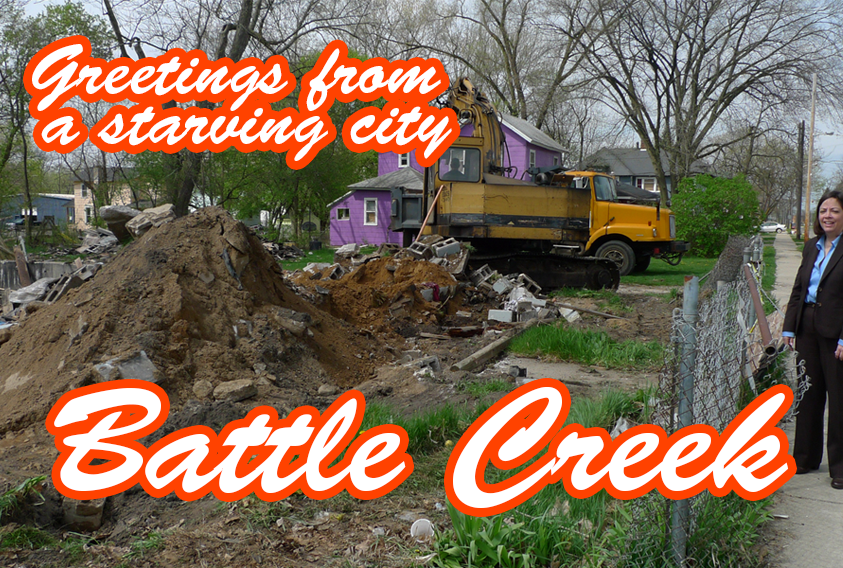In Battle Creek, a starving Cereal City
BATTLE CREEK – In Cereal City, City Manager Rebecca Fleury can count on serial headaches.
At the police department, built in 1970, stains from leaking plumbing remain on ceiling tiles; the leaks have been repaired, but the sewage smell remains, at least in the lower level. Office supplies are stored in a women’s restroom. The foundation is crumbling. The building should be demolished and replaced, but the city can’t afford that, Fleury said.
The city can’t afford a lot of what it needs, let alone what it wants.
Over at the public works department, a fire engine sits, windshield panels hanging out in sheets of shattered safety glass. The truck was in a rollover accident this winter, injuring four firefighters, which was bad enough. But the deductible on a new one is $50,000 – affordable, but unwelcome. Until they can be done, fire calls are answered by a reserve truck, one old enough that some of the crew sits in open-air seats. Imagine racing to a call in one of those seats in January.
“And if that one rolls over, someone’s going to die,” said Fleury, narrating a tour of Battle Creek’s patch-patch-patch municipal landscape.
No city department or service has been left untouched by the fiscal crunch of Michigan’s municipal finance system, with $23 million less in state revenue sharing since 2002, Fleury said. Like the stains in the police department, the evidence of disrepair is starting to pile up.
Where 11 code-compliance inspectors once covered the city, five remain, with blight creeping into some neighborhoods. Since 2008, 1,060 new entries have been added to the city’s dangerous-building list, Fleury said. In the Post-Franklin neighborhood, vacant houses dot South Avenue. Code compliance manager Jason Francisco points to one, noting that it sold in an online auction some years back to a buyer in Singapore, who has done nothing to make the house habitable again. Although the taxes are still being paid, he adds.
At the corner of Poplar and Cherry streets is a welcome sight: A backhoe operator is putting pieces of a foundation wall into a dump truck, all that remains of a vacant house that neighbors complained about regularly, Fleury said. Today it’s coming down. A rare win.
A few blocks away, Quaker Park is sprouting dandelions but nothing else -- the playground equipment was removed a while ago because it was deteriorating and the city couldn’t afford to replace it.
Fleury and Francisco point out a rutted road leading to an apartment complex. It used to be traveled by a city bus line, until road damage made it too hazardous for the vehicles to navigate. The bus was rerouted. The road is the responsibility of an adjacent township, “but they have their issues, too,” said Rich Werner, the city’s transit manager. “We’re all interconnected.”
With constitutional constraints on property tax increases, limited revenue sharing from the state and restraints on how much municipalities can increase their taxes without voter approval, cities like Battle Creek can only depend on a rising population to bring in more revenue. But the population has been flat or slightly declining in recent years, leading to a dilemma city managers like Fleury are well-acquainted with: “If we can’t keep things up, it will hurt us in population.”
See what new members are saying about why they donated to Bridge Michigan:
- “In order for this information to be accurate and unbiased it must be underwritten by its readers, not by special interests.” - Larry S.
- “Not many other media sources report on the topics Bridge does.” - Susan B.
- “Your journalism is outstanding and rare these days.” - Mark S.
If you want to ensure the future of nonpartisan, nonprofit Michigan journalism, please become a member today. You, too, will be asked why you donated and maybe we'll feature your quote next time!


 A demolition is never a pretty sight, but residents near this overdue teardown of a burned-out home in Battle Creek last month found it welcome. City Manager Rebecca Fleury said neighbors had been complaining about it for months, but only recently did the cash-strapped city have the money to carry it out. (Bridge photo by Nancy Derringer)
A demolition is never a pretty sight, but residents near this overdue teardown of a burned-out home in Battle Creek last month found it welcome. City Manager Rebecca Fleury said neighbors had been complaining about it for months, but only recently did the cash-strapped city have the money to carry it out. (Bridge photo by Nancy Derringer)